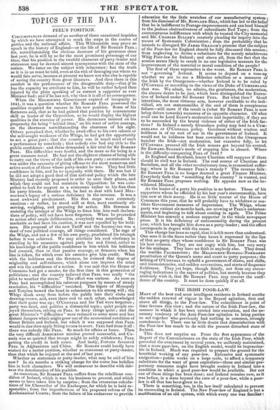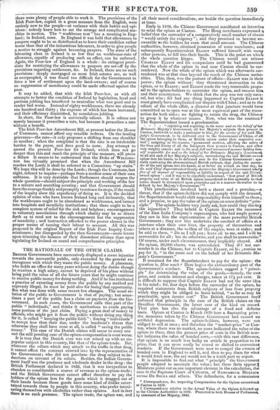THE IRISH POOR-LAW.
MANY of the best and most intelligent residents in Ireland ascribe the sudden renewal of vigour in the Repeal agitation, first and above all thirtig, to the Poor-law. The coincidence in point of time favours this view ; and the nature of the Irish Poor-law, the manner in whi,$)j it has been carried into execution, and the ne- cessary tendency of the Anti-Poor-law agitation to bring parties to act together who previously had nothing in common, strongly corroborate it. There can be little doubt that dissatisfaction with the Poor-law has much to do with the present disturbed state of Ireland.
This does not surprise us. From the first appearance of the Report of the Commissioners on the state of the Irish Poor, which preceded the enactment by several years, we uniformly maintained, that a mere ppor-law, on the English model, would be impractica- ble in Ireland L Much was required to prepare the ground for the beneficial working of any poor-law. Extensive and systematic emigration— public works on a large scale, to afford a temporary substitute for the want of great capitalists—these and similar pre- paratory measures might have brought society in Ireland into a condition in which a good poor-law would be available. But not one of these things has been done ; and Ireland remains now, as it was before, in a state beyond the cure of a poor-law, while a poor- law is all that has been given to it. There is something, too, in the law itself calculated to prevent its succeeding in Ireland. The New Poor-law of England is but a modification of an old system, with which every one was familiar '
there were plenty of people able to work it. The provisions of the Irish Poor-law, copied in a great measure from the English, were entirely new to the people—at variance with their habits and opi- nions: nobody knew how to set the strange and complicated ma- chine in motion. The "workhouse test" has a meaning in Eng- land; in Ireland, none. In England it was held that allowances to paupers ought to be so distributed as to leave their condition rather worse than that of the industrious labourers, in order to give people a motive to struggle against becoming paupers. The state of the labouring class in Ireland is so low that no workhouse-rate of allowance, capable of producing such an effect, can be enforced. Again, the Poor-law of England is a whole : its stringent provi- sions for restricting the allowances to paupers are set-off by the provisions regarding settlement, &c. In Ireland, there are no such provisions : deeply mortgaged as most Irish estates are, as well as overpeopled, it was found too difficult for the Government to force a law of settlement upon the land-owners ; and of course no suppression of mendicancy could be made effectual against the poor. It may be added, that with the Irish Poor-law, as with all attempts to better the condition of Ireland by legislation, local and partisan jobbing has interfered to neutralize what was good and to render bad worse. Instead of eighty workhouses there are already one hundred and thirty ; the expense of which has been increased, and their efficiency diminished, by scandalous jobbing. In short, the Poor-law is universally odious. It is odious not merely because it prescribes a rate, but because it prescribes a rate without a benefit.
The Irish Poor-law Amendment Bill, at present before the House of Commons, cannot afford any sensible redress. On the leading grievance—the rate—it only proposes a shifting from one shoulder so another; when the complaint is that the rate is an intolerable burden to the payer, and does good to none. Any attempt to amend the present Poor-law for Ireland, which does not go deeper than this and reach the principle of the measure, will prove a failure It seems to he understood that the Duke of WELLING- TON has virtually promised that when the Amendment Bill reaches the Lords it shall be referred to a Committee "up stairs." We hope this will be done by the Lords ; though the Commons, last night, refused to inquire—perhaps from a modest sense of their own unfitness. It is very desirable that Parliament should reopen the whole question—should subject the principle and working of the law to a minute and searching scrutiny ; and that Government should have the courage frankly and promptly to retrace its steps, if the result of the inquiry show the expediency of doing so. It is the decided opinion of some who have known Ireland long and intimately, that the workhouses ought to be abandoned as workhouses, and turned into hospitals and mendicity institutions ; that there ought to be a complete system of relief for the sick and helpless ; encouragement to voluntary associations through which charity may be so drawn forth as to tend not to the encouragement but the suppression of mendicity ; and instruction afforded to the poorer classes in the proper means of turning their labour to account. All this was proposed in the original Report of the Irish Poor Inquiry Com- missioners; but disregarded by the then Government—more intent upon trimming the balance of their discordant alliance than upon legislating for Ireland on sound and comprehensive principles.



























 Previous page
Previous page